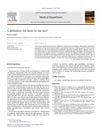 13 citations,
March 2019 in “Physiological Research”
13 citations,
March 2019 in “Physiological Research” Overweight women with PCOS have higher levels of certain hormones that could indicate a higher risk of heart and metabolic problems.
[object Object]  4 citations,
September 2013 in “Expert Review of Endocrinology & Metabolism”
4 citations,
September 2013 in “Expert Review of Endocrinology & Metabolism” Different types of polycystic ovary syndrome show varying levels of insulin resistance, with the 'PHO' type being the most insulin resistant.
 2 citations,
June 2017 in “Journal of The American Academy of Dermatology”
2 citations,
June 2017 in “Journal of The American Academy of Dermatology” The type of PCOS a woman has doesn't strongly predict her skin or metabolic symptoms; obesity is a more important factor.
 162 citations,
January 2015 in “Trends in Endocrinology and Metabolism”
162 citations,
January 2015 in “Trends in Endocrinology and Metabolism” Women with PCOS face higher risks of diabetes and heart disease, and these risks increase with obesity.
 9 citations,
May 2015 in “Cardiology Clinics”
9 citations,
May 2015 in “Cardiology Clinics” The conclusion is that managing cholesterol is important for women, especially during pregnancy, breastfeeding, and with PCOS, and involves regular screening and careful treatment choices.
 286 citations,
January 2009 in “Human Reproduction Update”
286 citations,
January 2009 in “Human Reproduction Update” Women with the NIH type of PCOS have more obesity and higher risk of diabetes and heart disease than those with other types of PCOS.
 3 citations,
June 2023 in “European heart journal open”
3 citations,
June 2023 in “European heart journal open” Women with irregular periods have a higher risk of heart disease.
 September 2024 in “Journal of Cutaneous and Aesthetic Surgery”
September 2024 in “Journal of Cutaneous and Aesthetic Surgery” Bicalutamide may help treat female pattern hair loss.
 29 citations,
February 2018 in “Genetics research international”
29 citations,
February 2018 in “Genetics research international” Certain genetic variations are linked to increased androgen levels in PCOS, but more research is needed to understand these connections fully.
 9 citations,
January 2015 in “Springer eBooks”
9 citations,
January 2015 in “Springer eBooks” The document concludes that managing PCOS involves treating symptoms, regulating periods, and reducing health risks, with specific medications for fertility and metabolic issues.
 3 citations,
February 2016 in “Endocrinology and Metabolism Clinics of North America”
3 citations,
February 2016 in “Endocrinology and Metabolism Clinics of North America” Manage women's cholesterol with diet, exercise, and careful treatment choices, especially during pregnancy, PCOS, and menopause.
 200 citations,
October 2009 in “European journal of endocrinology”
200 citations,
October 2009 in “European journal of endocrinology” Metformin helps manage polycystic ovary syndrome by improving insulin resistance and ovulation, but more research is needed on its full effects.
 21 citations,
July 2019 in “Cardiovascular Research”
21 citations,
July 2019 in “Cardiovascular Research” High levels of male hormones in pregnant mice cause heart enlargement and poor heart function in their female babies.
 9 citations,
September 2016 in “Medical Clinics of North America”
9 citations,
September 2016 in “Medical Clinics of North America” Eating less and exercising more, with personalized diet plans and realistic goals, can lead to weight loss and better health, but more research is needed for long-term success.
 467 citations,
October 2014 in “European Journal of Endocrinology”
467 citations,
October 2014 in “European Journal of Endocrinology” The European Society of Endocrinology advises individualized long-term management for PCOS, focusing on lifestyle changes, accurate diagnosis, and treatments for associated health risks and symptoms.
 356 citations,
September 2014 in “Journal of Clinical Research in Pediatric Endocrinology”
356 citations,
September 2014 in “Journal of Clinical Research in Pediatric Endocrinology” Childhood obesity is rising globally due to various factors, and early prevention and healthy lifestyle changes are crucial.
 47 citations,
May 2020 in “Cardiovascular Research”
47 citations,
May 2020 in “Cardiovascular Research” The document concludes that future heart disease research should account for sex-specific differences to improve diagnosis, treatment, and outcomes.
 18 citations,
June 2017 in “Journal of The American Academy of Dermatology”
18 citations,
June 2017 in “Journal of The American Academy of Dermatology” Trichoscopy helps diagnose frontal fibrosing alopecia, even with unusual patterns.
 5 citations,
April 2013 in “Current Problems in Pediatric and Adolescent Health Care”
5 citations,
April 2013 in “Current Problems in Pediatric and Adolescent Health Care” The document concludes that early and personalized treatment for PCOS in adolescents is crucial to manage symptoms and prevent long-term health issues.
 3 citations,
September 2021 in “International Journal of Molecular Sciences”
3 citations,
September 2021 in “International Journal of Molecular Sciences” Androgens and a high-fat diet may increase the risk of severe COVID-19 in women with PCOS by upregulating certain proteins in the heart and kidneys.
317 citations,
April 2018 in “Journal of steroid biochemistry and molecular biology/The Journal of steroid biochemistry and molecular biology” PCOS is a complex condition in women that can lead to health issues, and lifestyle changes are the best management approach.
 1 citations,
January 2023 in “Metabolites”
1 citations,
January 2023 in “Metabolites” Changes in gut bacteria can contribute to the development of Polycystic Ovary Syndrome (PCOS), affecting metabolism, immunity, and causing inflammation. Treatments may involve adjusting these factors.
[object Object]  December 2024 in “Frontiers in Neurology”
December 2024 in “Frontiers in Neurology” Testosterone with finasteride improved muscle and bone health in men with spinal cord injury.
 August 2023 in “Journal of Clinical Medicine”
August 2023 in “Journal of Clinical Medicine” Metformin lowers prolactin in women without PCOS but not in those with PCOS, where it reduces other hormones instead.
 July 2023 in “Journal of Clinical Medicine”
July 2023 in “Journal of Clinical Medicine” Tirzepatide might help manage PCOS in obese patients but needs more research to confirm safety and effectiveness.
 2 citations,
May 2024 in “Journal of science and medicine in sport”
2 citations,
May 2024 in “Journal of science and medicine in sport” Exercise is crucial for managing polycystic ovary syndrome (PCOS) and improving overall health.
 19 citations,
March 2008 in “Nature clinical practice endocrinology & metabolism”
19 citations,
March 2008 in “Nature clinical practice endocrinology & metabolism” A combined drug and laser treatment improved hirsutism in a PCOS patient, also enhancing her heart health and requiring regular liver and kidney checks.
 32 citations,
April 2016 in “Journal of Obstetrics and Gynaecology Research”
32 citations,
April 2016 in “Journal of Obstetrics and Gynaecology Research” Women with severe types of PCOS are more likely to have metabolic syndrome, and belly fat is a key predictor of this risk.
 4 citations,
December 2012 in “Medical Hypotheses”
4 citations,
December 2012 in “Medical Hypotheses” Prediabetes may be a risk factor for hair loss.
 198 citations,
July 2011 in “Cochrane library”
198 citations,
July 2011 in “Cochrane library” Lifestyle changes can improve body composition, excess male hormone levels, and insulin resistance in women with PCOS.





























